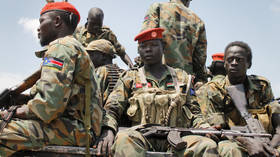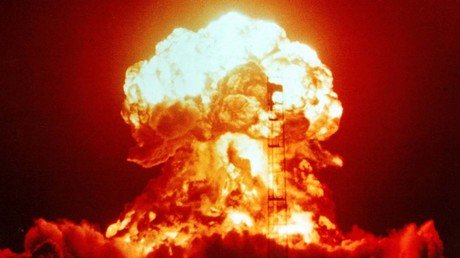Itch for ‘better INF deal’? Trump’s treaty ‘withdrawal symptom’ destabilizes global order
By scrapping the crucial Cold War era nuclear agreement Trump is destabilizing global security, even if his ultimate goal is to negotiate a ‘better deal’ and to include other parties like China, geopolitical experts have told RT.
“The United States would rather pull out because of China. Right now it cannot develop new intermediate-range missiles to confront China, even though China is not a signatory to that agreement,” former Pentagon official Michael Maloof said, after Donald Trump announced the US intention to scrap the INF treaty.
“The US is engaged in an arms race with China in the Pacific Ocean, and China has a whole bunch of those missiles that are not covered,” Iranian political scientist Kaveh Afrasiabi added, calling Trump's announcement a “giant leap backward to the Cold War era.”
Maloof blamed Washington for its empty rhetoric and failure to explain what exactly it accuses Moscow of, while Afrasiabi pointed at the US encirclement of Russia by AEGIS ashore systems capable of launching INF-banned missiles in Europe.
“Nobody knows what those violations are. Is it the idea of developing a new cruise missile?” Maloof wondered. “The treaty does not prohibit that. And the United States is developing new intermediate missiles and cruise missiles. But again they can develop them, they can research but they just can’t deploy.”
“If president Trump acts on his threat and they go ahead and develop the new intermediate missiles the only place to put them, of course, is in the NATO countries in proximity to Russia which will be a very destabilizing factor,” Afrasiabi explained.
American politician and Middle East analyst Paul Heroux, meanwhile, told RT that Washington lost all credibility in levelling charges against other nations following the invasion of Iraq in 2003, as he called on the US to produce hard evidence against Russia.
“If there is some type of evidence that Russia has violated the treaty then the United States should produce that evidence unequivocally,” Heroux noted.
What’s INF & why does it matter? Trump wants to kill pivotal nuclear treaty that calmed the Cold War https://t.co/Wc5FtLWugs
— RT (@RT_com) October 20, 2018
Trump's “withdrawal symptom” undermining the INF as well as other international treaties, is destabilizing for global security, experts are warning, blaming the US for its refusal to sit down and talk with the Kremlin to clear any disagreements the sides might have regarding the 1987 deal, which eliminated nuclear and conventional ground-launched ballistic and cruise missiles with ranges of 500 to 5,500 kilometers.
“There has only been one meeting between the United States and Russia over a number of years in fact,” Maloof noted. “If they were really serious trying to correct the problem, if in fact there was one, they would have sat down and talked. But Bolton does not want to deal with Russia.”
The former Pentagon official pinned the blame for Trump’s decision on his national security adviser, calling John Bolton a “very dangerous fellow,” all while stressing that “Trump is really not in charge of his own foreign policy.”
Maloof believes that pulling out of the INF deal is in line with Trump's 'America First' policy where the US president might want to try and negotiate a “better deal” within the six-month timeframe allocated under the terms of the INF treaty to terminate the accord.
Afrasiabi, who maintains that Trump is “out to destroy Reagan's legacy” also thinks that the US might be seeking a new comprehensive agreement, probably with additional parties like China, to replace the INF, which does not cover air- and sea-launched intermediate missiles. Yet Trump’s approach and his treaty “withdrawal symptom,” the Iranian political scientists warned, is extremely “dangerous.”
“Unfortunately, we are witnessing a President in the White House who openly embraces the arms race and ... has promised to outlast and outmatch the rivals,” he said. “This is a very wrong approach to these problems and destabilizes the global order.”
Think your friends would be interested? Share this story!















